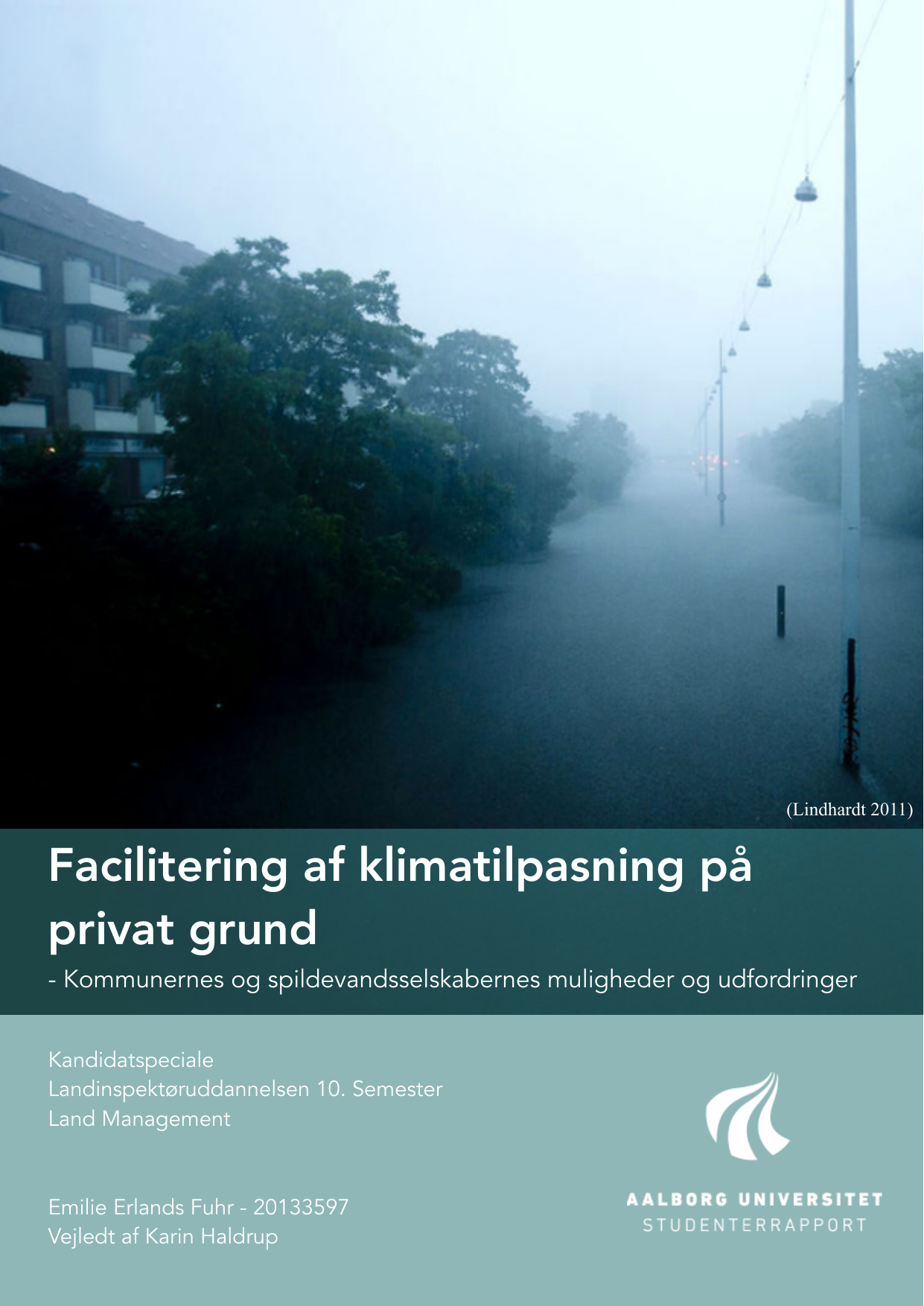
Facilitering af klimatilpasning på privat grund - Kommunernes og spildevandsselskabernes muligheder og udfordringer
Oversat titel
Facilitation of Climate Adaptation on Private Property - The Opportunities and Challenges of the Danish Municipalities and the Waste Water Companies
Forfatter
Semester
4. semester
Udgivelsesår
2011
Afleveret
2018-06-11
Antal sider
140
Abstract
Klimatilpasning har konventionelt været et internt teknisk anliggende i de danske kommuner, der udførtes ad hoc som problemerne opstod. I takt med det øgede offentlige og politiske fokus på klimaforandringerne, og det igangværende paradigmeskift fra government til governance, har der imidlertid været behov for en tilgangsændring. Fra statslig side tilskyndes, at kommunerne samarbejder på tværs af myndigheder og borgere, samt udvikler innovative løsninger. Spildevandsselskabernes udskillelse fra kommunerne i 2009 har medført, at kommunerne ikke længere har ejerskab over de fælles spildevandssystemer, som klimatilpasning for oversvømmelser i praksis planlægges igennem. Spildevandsselskaberne har dermed også et centralt ansvar og en interesse i klimatilpasning. Endvidere har de private grundejere ansvar for at sikre egen grund. Derfor er samarbejde blandt de tre ansvarshavende aktører en grundlæggende forudsætning for implementering af klimatilpasningstiltag. Dog ses en udfordring i at mobilisere de private grundejere i den fælles indsats, så de offentlige og private løsninger indgår i sammenhæng. Derfor er klimatilpasning en praksis i udvikling. På dette grundlag undersøger dette speciale, hvilke muligheder og udfordringer der er for kommunerne og spildevandsselskabernes implementering af klimatilpasning på privat grund. I den forbindelse er afgrænset til klimatilpasning for nedbørshændelser i boligområder i byzonen. Specialet vil inkludere en undersøgelse af privat grund, der er et paraplybegreb; fokus i denne analyse begrænses af specialets fokus på boligområder i byzonen, hvorfor privat grund inkluderer boligtyper og vejtyper. Derudover vil specialet undersøge den gældende lovgivning, samt hvordan klimatilpasning er implementeret i den fysiske planlægning, for at forstå policy rammen. Dette vil sammenfattes i en kortlægning af, hvilke værktøjer kommunerne og spildevandsselskabernes har til at implementere klimatilpasning på privat grund. Specialet vil endvidere anvende casestudier til at undersøge, hvordan kommunerne i praksis anvender de givne værktøjer, til at implementere klimatilpasning i praksis. Derved vil dette speciale anskueliggøre de muligheder og udfordringer, som kommunerne og de kommunale spildevandsselskaber oplever i forbindelse med klimatilpasning, og give valide input til, hvordan disse kan imødekommes.
Conventionally, climate adaptation has been managed by Danish municipalities as an internal, technical matter addressed on ad hoc basis as need for action occurred. Following the increased public and political focus on climate change and an ongoing paradigm shift from Government to Governance, it has been necessary to change the modus operandi in municipal practice. The waste water companies were spun off from the municipalities in 2009, following which the municipalities no longer own the sewage systems that form parts of any preventive climate adaptation against excessive precipitation. Thus, the waste water companies are central players with an essential responsibility and interest in climate adaptation. Other central players are the private property owners because they bear the responsibility of securing their own property against negative climate impact. Therefore, successful implementation of climate adaptation measures requires that municipalities, waste water companies and property owners are able to work together. However, in this three-party interaction, there is a challenge in mobilizing and incentivizing the property owners to engage in joint public and private adaptation efforts. Therefore, in the context of Danish, municipal management, adaptation to climate change is a practice in on-going development. On basis hereof, this Thesis investigates opportunities and challenges associated with Danish municipalities’ and waste water companies’ climate change adaptation on private property. The investigation is defined to climate change adaptation against excessive precipitation events in private housing in urban areas. The investigation will include an analysis of types of private property and ownership structures; in this context limited to domestic housing and roads. To be able to understand the policy framework, the Thesis will address how climate change adaptation is being implemented in the spatial planning based on current, Danish legislation. The analysis of property ownership structures and the legislative framework will be used to outline which tools the Danish municipalities and waste water companies have to execute climate adaption projects in practice on private property. Finally, case studies will be used as a means to analyze how Danish municipalities use the tools in practice. Thereby, the Thesis will clarify the opportunities and challenges that the municipalities and the municipal waste water companies are facing and provide valid inputs on how to accommodate these.
Emneord
